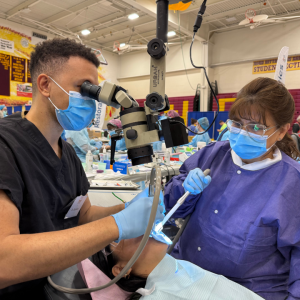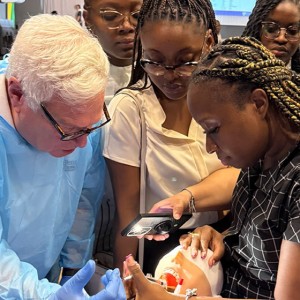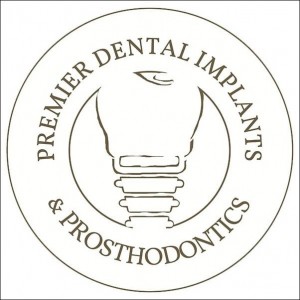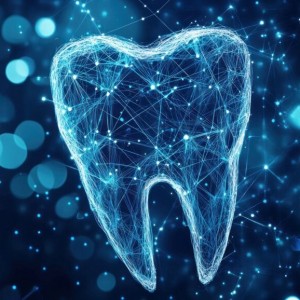
Oral health and mental health: a possible correlation
Lara Figini
Mental health has long been a source of confusion for researchers and clinicians, and this is largely due to a lack of understanding regarding the causal factors of neurophysiological and psychiatric disorders, which can be physiological, genetic, social and environmental.
Recent discoveries have shown that brain health is more related to systemic health than previously believed. For example, microbial communities within the body or microbiota can play a key role in noncommunicable diseases, such as obesity and diabetes, and affect mental and neurological health.
Research so far has focused predominantly on the gastrointestinal tract, which contains the majority of the microbiota associated with the human organism, both in number and diversity of species, so the primary results in the context of microbe-brain interactions have been obtained through the Gut-Brain-Axis (GBA).
GBA refers to the complex bi-directional interactions and processes used by the gut microbiome and the brain to communicate with each other.
Because bacteria possess hormone receptors and perform and utilize quorum sensing they can sense and produce autoinducing molecules that function within the bacteria in a similar way to hormones in the host by regulating bacterial growth, motility and virulence functions.
The oral cavity is the beginning of the digestive system and is the primary entry point for entry of microbes and non-microbes into the body.
The results of several literature studies demonstrate that the oral microbiota is directly involved in neuropsychiatric disorders.
Materials, methods
In a review published in Frontiers in Psychiatry in March 2022, the authors reviewed recent studies that had investigated the direct causal mechanisms by which the oral microbiota contributes to the development and progression of mental illness.
Based on these studies the authors propose a theoretical basis for an oral microbiota-brain axis (OMBA):
- microbial load and escape of metabolites,
- neuroinflammation,
- CNS signaling, and
- response to neurohormones.
Application of this OMBA framework may help link microbial dysbiosis to the progression and outcome of neuropsychiatric disorders.
This is confirmed by research presented at the American Stroke Association's 2023 International Stroke Conference. Between 2014 and 2021, researchers analyzed the potential link between oral health and brain health in approximately 40,000 adults (46% men, average age 57), without a history of stroke, enrolled in the UK Biobank.
Researchers screened participants for 105 genetic variants known to predispose people to tooth decay, edentulism and missing teeth, and the relationship between the weight of these genetic risk factors for poor oral health and brain health was assessed.
Signs of poor brain health were examined via MRI images of the participants' brains:
- white matter hyperintensity, defined as accumulated damage in the white matter of the brain, which can impair memory, balance, and mobility;
- microstructural damage, which is the degree of alteration of the fine architecture of the brain compared to images from a normal brain scan of a healthy adult of the same age.
Results
The results of this preliminary research showed that people who were genetically prone to tooth decay, were toothless, or needed dentures had a higher burden of silent cerebrovascular disease, with a 24 percent increase in the amount of white matter hyperintensity visible in MRI images.
Subjects with generally poor oral health had more damage to the fine architecture of the brain, represented by a 43% change in microstructural damage scores visible on MRI scans.
Conclusions
From the data of recent studies, researchers concluded that poor oral health can cause a decline in brain health. Dentists must talk with their patients about the importance of taking better care of their oral hygiene since it has implications far beyond the mouth. Future studies of the oral-microbiota-brain axis in conjunction with interdisciplinary approaches can be used to identify neuropsychiatric disorders risks and improve outcomes, as well as develop novel intervention and treatment strategies.
 Related articles
Related articles
Editorials 13 November 2025
UW President Robert Jones and Gonzaga University President Katia Passerini joined elected officials in Spokane to tour the Regional Initiatives in Dental Education (RIDE’s) new 13,000-square-foot...
Oral Hygiene & Prevention 07 November 2025
Hashim R. Self-reported oral health, oral hygiene habits and dental service utilization among pregnant women in United Arab Emirates.
Products 29 October 2025
Roseman University of Health Sciences and PDS Health recently celebrated the dedication and ribbon-cutting of the new Thorne Clinic for Integrative Oral Health.
Endodontist Brandon Barnett was set to focus his health law project at Yale School of Public Health on access to care through Medicaid.
Digital Dentistry 15 October 2025
The Impact of Artificial Intelligence on Diagnostic Accuracy and Treatment Planning in Dentistry
The use of AI in dentistry is revolutionizing the field of dentistry by enhancing the accuracy of diagnosis and treatment.
 Read more
Read more
Periodontology 14 November 2025
This study was carried out to assess the oral hygiene awareness and practices amongst patients visiting the Department of Periodontology at Gian Sagar Dental College and Hospital, Ramnagar (Patiala).
Editorials 14 November 2025
Penn Dental Medicine shared its expertise in caring for persons with disabilities with dental care providers from throughout Jamaica at a 1 ½ -day hands-on continuing education program, held October...
News 14 November 2025
Dr. Thomas M. Paumier, a dentist in Canton, Ohio, is the new President-Elect of the American Dental Association (ADA). Dr. Paumier was elected at the ADA House of Delegates meeting in Washington,...
News 14 November 2025
Premier Dental Implants & Prosthodontics is proud to announce the opening of its newly renovated dental office and the launch of its new website
News 14 November 2025
Henry Schein One and AWS Collaborate to Transform Global Dentistry with Generative AI
Industry leaders join forces to bring advanced AI capabilities to dental technology platforms — redefining patient care, clinical efficiency, and practice performance worldwide














